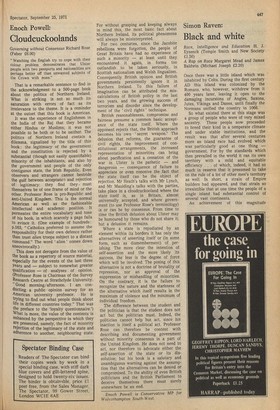Enoch Powell:
Cloudcuckoolands
Governing without Consensus Richard Rose (Faber £6.00) " Watching the English try to cope with their colour problem demonstrates that Ulster people with two passports and nationalities are perhaps better off than unwanted subjects of the Crown with none."
That is a remarkable sentence to find in the acknowledgment to a 500-page book about the politics of Northern Ireland. What is striking is not so much its saturation with errors of fact as its irrelevance to the theme. It is a reminder at the outset that this book is American.
It was the experience of Englishmen in the India of the Raj that they became either Hindus or Muslims; it was not possible to be both or to be neither. The politics of Northern Ireland contain a dilemma, signalized by the title of this book : the legitimacy of the government and the constitution is rejected by a substantial (though not easily quantifiable) minority of the inhabitants, and also by the government and people of the only contiguous state, the Irish Republic. Even observers and strangers cannot bestride the gulf between acceptancr: and rejection of legitimacy: they find they. must themselves be of one frame of mind or the other. Professor Rose is pro-Republic and anti-United Kingdom. This is the normal American as well as the fashionable intellectual and academic position. It Permeates the entire vocabulary and tone of his book, in which scarcely a page fails to evince it. (One example of hundreds : p.163, "Catholics preferred to assume the responsibility for their own defence rather than trust alien troops subject to a distant Command." The word ' alien ' comes down uneovivocally.)
This does not derogate from the value of the book as a repertory of source material, especially for the events of the last three years and — subject to somewhat greater qualification — of analyses of opinion. (Professor Rose is Chairman of the Survey Research Centre at Strathclyde University.
Good morning/afternoon. I am conducting a public opinion survey for an American university professor. He is trying to find out what people think about life in different countries today." That was the preface to the 'loyalty questionnaire.') What is more, the value of the contents is enhanced by the perspective in which they are presented, namely, the fact of minority rejection of the legitimacy of the state and adherence to another, neighbouring state.
For without grasping and keeping always in mind this, the most basic fact about Northern Ireland, its political phenomena will always be misinterpreted.
For two centuries, since the Jacobite rebellions were forgotten, the people of Great Britain have had no experience of such a minority — at least until they encountered it again, in forms too outlandish to be taken seriously, in Scottish nationalism and Welsh lingualism. Consequently British opinion and British governments persistently ignore it in Northern Ireland. To this failure of imagination can be attributed the miscalculations of British policy in the last two years, and the growing success of terrorism and disorder since the development of the civil rights ' technique.
British reasonableness, compromise and fairness presume a common basic acceptance of the state itself. Where the opponent rejects that, the British approach becomes his own 'secret weapon.' The delusion that reforms, the guarantee of civil rights, the improvement of constitutional arrangements, the increased representation of minorities can bring about pacification and a cessation of the war in Ulster is the pathetic — and dangerous — consequence of failure to appreciate or even conceive the fact that the state itself can be the object of rejection. Mr Heath's talks with Mr Lynch, and Mr Moulding's talks with the parties, take place in a cloudcuckooland where the state itself is, as in Britain, almost universally accepted, and where government (to use Professor Rose's terminology) is or can be by consensus. From time to time the British delusion about Ulster may be humoured by those who do not share it; but a delusion it remains.
Where a state is repudiated by an element within its borders it has only the alternatives of asserting itself or (in some form, such as dismemberment) of perishing. The more clear the intention of self-assertion and the more likely its success, the less is the degree of force which will be involved. The posing of this alternative is not a doctrine of brutality or repression, nor an approval of the suppression or mishandling of minorities. On the contrary, it is the failure to recognize the nature and the starkness of the alternative which itself results in the maximum of violence and the minimum of individual freedom.
The difference between the student and the politician is that the student does not act but the politician must. Indeed, the politician cannot help but act, since his inaction is itself a political act. Professor Rose can therefore be content with describing and documenting government without minority consensus in a part of the United Kingdom. He does not need to act, nor therefore to advocate either the self-assertion of the state or its dis solution; but his book is a salutary and unambiguous warning against the assumption that the alternatives can be denied or
compromised. To the ability of even British politicians and the British Parliament to deceive themselves there must surely somewhere be an end.
Enoch Powell is Conservative MP for Wolverhampton South-West.


































 Previous page
Previous page